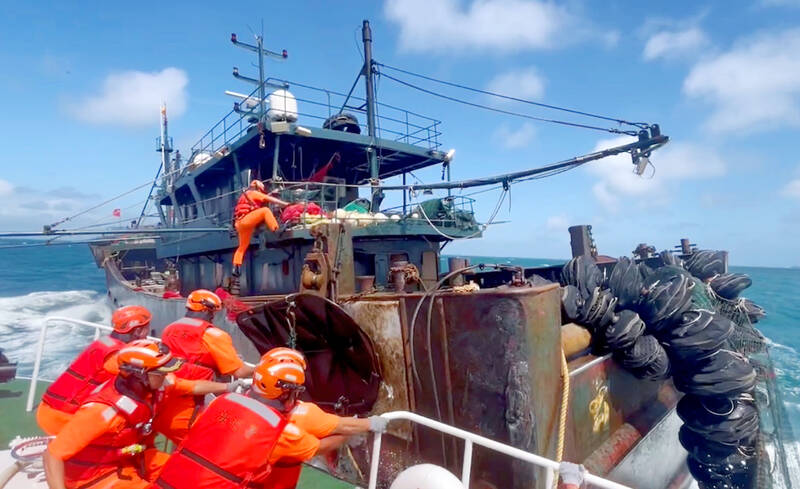Funds frozen by the Legislative Yuan might mean that the Ocean Affairs Council (OAC) cannot take delivery of two coast guard ships, harming its credibility with contractors for future purchases, OAC Minister Kuan Bi-ling (管碧玲) said in an interview yesterday.
Even though the OAC’s fiscal 2025 funding is greater than the previous year — despite the Legislative Yuan freezing or cutting NT$1 billion (US$30.54 million) for it and its subsidiary agencies — the cuts would still affect many of its medium and long-term projects, as they require higher payments in the later stages, Kuan said.
The increase in funding indicates that projects are due, but with the cuts, the OAC would be unable to make payments, she said.

Photo courtesy of the Ocean Affairs Council
For example, payments for the two patrol vessels — which are completed — would not be made because of the budget cuts, she said, adding that it would have to wait until next year to collect the ships.
The budget cuts would undermine national security, as the Coast Guard Administration (CGA) would not have enough ships to deal with threats posed by China Coast Guard vessels and “gray zone” tactics, including possible attempts to sever undersea cables near Taiwan, she said.
Foreign research and reports show that the line between what ships are Chinese research vessels and what are part of the Chinese People’s Liberation Army Navy fleet has blurred, Kuan said, adding that the OAC believed the so-called research vessels are not purely for research, but also play a role in China’s grand strategy, as undersea geography and topography, as well as hydrographic surveys, are strategic information.
The CGA would deploy its own vessels to chase Chinese research ships out of Taiwanese waters if incursions occur, Kuan said.
However, the budget issues must be resolved, either through inter-caucus discussions at the legislature or by the Executive Yuan authorizing additional funds, she said.
Budget freezes are typically used to bring agencies to the legislature to explain their funding proposals, but the actions this year would underfund agencies, she said.
The OAC plans to contract ship builders this year, but they would have to determine whether they want to take the risk, as the council would have only 70 percent of its funding, she said.

‘TAIWAN-FRIENDLY’: The last time the Web site fact sheet removed the lines on the US not supporting Taiwanese independence was during the Biden administration in 2022 The US Department of State has removed a statement on its Web site that it does not support Taiwanese independence, among changes that the Taiwanese government praised yesterday as supporting Taiwan. The Taiwan-US relations fact sheet, produced by the department’s Bureau of East Asian and Pacific Affairs, previously stated that the US opposes “any unilateral changes to the status quo from either side; we do not support Taiwan independence; and we expect cross-strait differences to be resolved by peaceful means.” In the updated version published on Thursday, the line stating that the US does not support Taiwanese independence had been removed. The updated

‘CORRECT IDENTIFICATION’: Beginning in May, Taiwanese married to Japanese can register their home country as Taiwan in their spouse’s family record, ‘Nikkei Asia’ said The government yesterday thanked Japan for revising rules that would allow Taiwanese nationals married to Japanese citizens to list their home country as “Taiwan” in the official family record database. At present, Taiwanese have to select “China.” Minister of Foreign Affairs Lin Chia-lung (林佳龍) said the new rule, set to be implemented in May, would now “correctly” identify Taiwanese in Japan and help protect their rights, the Ministry of Foreign Affairs said in a statement. The statement was released after Nikkei Asia reported the new policy earlier yesterday. The name and nationality of a non-Japanese person marrying a Japanese national is added to the

AT RISK: The council reiterated that people should seriously consider the necessity of visiting China, after Beijing passed 22 guidelines to punish ‘die-hard’ separatists The Mainland Affairs Council (MAC) has since Jan. 1 last year received 65 petitions regarding Taiwanese who were interrogated or detained in China, MAC Minister Chiu Chui-cheng (邱垂正) said yesterday. Fifty-two either went missing or had their personal freedoms restricted, with some put in criminal detention, while 13 were interrogated and temporarily detained, he said in a radio interview. On June 21 last year, China announced 22 guidelines to punish “die-hard Taiwanese independence separatists,” allowing Chinese courts to try people in absentia. The guidelines are uncivilized and inhumane, allowing Beijing to seize assets and issue the death penalty, with no regard for potential

There is no need for one country to control the semiconductor industry, which is complex and needs a division of labor, Taiwan’s top technology official said yesterday after US President Donald Trump criticized the nation’s chip dominance. Trump repeated claims on Thursday that Taiwan had taken the industry and he wanted it back in the US, saying he aimed to restore US chip manufacturing. National Science and Technology Council Minister Wu Cheng-wen (吳誠文) did not name Trump in a Facebook post, but referred to President William Lai’s (賴清德) comments on Friday that Taiwan would be a reliable partner in the